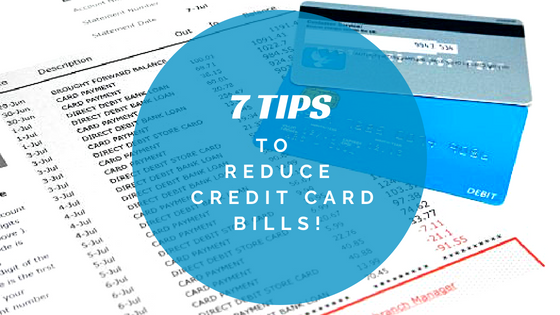If you have a large amount of credit card debt and you are only making minimum payments every month, you are not going to pay it off any time soon. In fact, if you only make minimum payments, it could be decades before you find yourself debt-free again. It is extremely important to put yourself in a proper financial position, and a good way of doing that is by reducing your credit card bills.
Tips to reduce Credit Card Bills:
Here are a few tips on how to reduce your credit card bills that will help you pay off your debt:
1. Take Stock:
Before you start to reduce your credit card bills make sure you know where you stand. By this, we mean know your target. You will never hit the target if you don’t know where it is, so be honest with yourself.
2. Pay more than the minimum:
As discussed before, if you only make minimum payments each month, then it will take ages before you find yourself debt-free again. Thus, it is clear that paying more than the minimum due you can lower your monthly credit card bills, but still, so many customers struggle in making that the priority. Making a little more than the minimum payment every month will eventually help you in the long run.
3. Ask your credit card company for lower rates:
A simple and quick way to lower your credit card bill is by negotiating a lower interest rate. Just by reducing the rate of interest by one or two percent, you can save hundreds of bucks. Try calling your creditors and ask them politely to lower your rates. If you have a good credit score and have been a loyal customer to them, then you can easily negotiate and get yourself a lower interest rate.
4. Target one card at a time:
People often use multiple credit cards to buy stuff. More cards mean more accounts which eventually leads to more debts. If you are using multiple credit cards, then a good way to lower the bill is by targeting one card at a time. Focus on one account and try to clear that first. Get the minimum for each card, but pay as much as you can on the card you are targeting first. Usually, paying the card with the highest interest rate works.
5. Make a budget:
Make yourself a budget every month and stick to it. It can be difficult to adjust your lifestyle too quick, so instead, try going for small adjustments. It can be as simple as cutting out one or two pizzas each week or by changing your thermostat by few degrees. Reducing your costs a little bit can help you out in the long run. Remember to save yourself a few extra bucks every month in case an unexpected bill pops up.
6. Make two minimum payments every month:
A good way to lower your bill is by making two minimum payments. Since credit cards apply interest daily, cutting your balance during the month will reduce the minimum payment for the next month.
7. Transfer your balance:
Another good way to reduce your monthly payments is by transferring the balance from a card with a high-interest rate to a card with a low-interest rate. If done properly, this can save you hundreds of bucks every year. Remember that credit cards with a low rate of interest are mostly introductory offers which last about a year and a half, so make sure pay off the debt before the rate of interest increases.
Conclusion:
We hope these tips can help you to reduce your credit card bills. If you know more tips on lowering the bill, post them in the comment sections below! hence if you want to make your choices in the right direction then the use if the credit card bills can make things work for you in all possible manners. Work out the best strategy that can help you to achieve your objectives in the best possible ways.
Read Also :






















